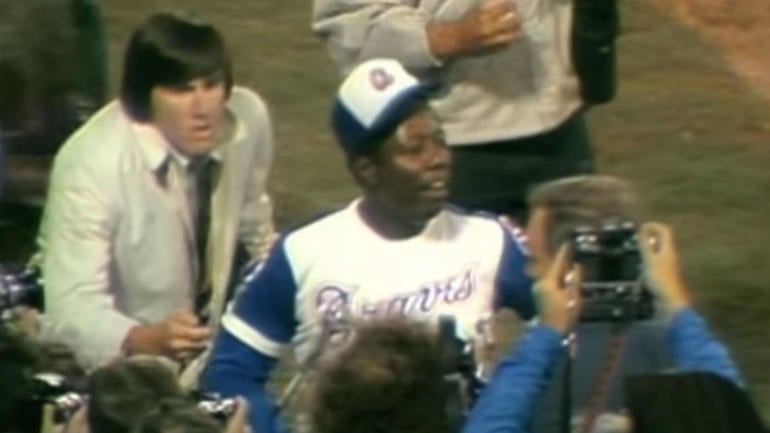
Hank Aaron, Major League Baseball's former home-run king and a cornerstone of the Atlanta Braves franchise, died on Friday. He was 86 years old.
Aaron's legacy has and will always be bigger than baseball, and the statistics and accolades he compiled while playing it. Still, there are few scenes that seem as certain to endure for as long as the sport exists as the one that saw Aaron clobber his 715th home run, thereby surpassing Babe Ruth as MLB's all-time home-run leader. (Aaron would hold onto that title until 2007, when Barry Bonds usurped him.)
With that in mind, let's revisit Aaron's record-breaking home run from April 8, 1974, and highlight four things that you may have forgotten or not known about it.
1. Aaron received death threats, hate mail
Viewing Aaron as little more than a great baseball player who broke a seemingly unbreakable record does a disservice to him, the facts, and the grim circumstances he faced. Aaron did more than adjust to breaking balls or defensive shifts; he had sufficient reason to fear for his life during his pursuit of Ruth, as racists and white supremacists sent him letters filled with racial slurs and threats, including diagrams detailing how an assassination could happen while Aaron was stationed in right field.
One of the individuals Aaron celebrated his 715th home run with on the field, besides his parents and his teammates, was an off-duty police officer named Calvin Wardlaw. Wardlaw, who had served as Aaron's bodyguard, was armed as he sat in the stands that night. Everyone remembers the image of two teenagers running onto the field to celebrate with Aaron. For Wardlaw, it was just another threat he had to assess.
"People asked me afterward, 'Where were you for the big moment, Calvin?'" he told the New York Daily News in 2007. "And I tell them that my instinct was at that moment that even if I could have gotten out there, my man was not in danger. And I tell them something else: What if I had decided to shoot my two-barreled .38 at those two boys, if I thought he was in a life-threatening situation, and had hit Hank Aaron instead, on the night he hit No. 715?"
Remembering the hatred toward Aaron isn't as fun as remembering the joy he exhibited or the respect he later commanded. It's far more important, however.
2. Record-breaker required a six-month wait
As you can tell by the April date, Aaron's 715h home run came early in the 1974 season. Indeed, the record-breaking blast was delivered in his eighth at-bat of the year. What's more is that it came in the Braves' fourth game, which doubled as their home opener. Had Aaron not sat out one of Atlanta's three games in Cincinnati against the Reds to start the campaign, he might've surpassed Ruth on the road.
Aaron had homered 40 times the preceding season, including in his final at-bat of the year. By doing so, he inadvertently created a six-month delay between Nos. 713 and 714. Comparatively, the trek from 714 to 715 took, well, nearly no time at all.
3. No. 715 came against a fitting foe
Aaron's home run came against Al Downing of the Los Angeles Dodgers. That's notable (and appropriate) because Aaron himself grew up a Dodgers fan who idolized Jackie Robinson -- to the extent that Aaron once skipped school to hear Robinson speak. Aaron later wrote that Robinson "gave us our dreams."
Though the Dodgers had moved to the west coast by the time Aaron hit No. 715, he was able to share the field a number of times with Robinson before the latter retired. In fact, the seventh home run of Aaron's big-league career came against the Dodgers, and was hit to deep left field, sailing over Robinson's head as it cleared the fence.
4. Familiar faces abound
As for No. 715, there were a number of other famous individuals involved whose presence should be noted, if only for posterity's sake.
Vin Scully, the longtime voice of the Dodgers, called the home run, observing that a "black man is getting a standing ovation in the Deep South." Craig Sager, the late sideline reporter, ran out onto the field and was the first to interview Aaron after he set the record. And then there was the left fielder, Bill Buckner, who was still years away from searing a different moment into baseball's collective memory.
History is funny like that.


















